How can we get an Stm32f103c8 running 72MHz with Arduino IDE (STM32duino)?
We have custom designed a PCB using the chip from the question. We are able to get it running at 72MHz using STM32CubeIDE. The clock configuration is shown below.
Clock Configuration Pinout
Pinout
It does run at 72MHz from CubeIDE. The Stm32f103C8 runs at 48MHz on default in ArduinoIDE.
We're using the stm32duino core (https://github.com/stm32duino/BoardManagerFiles/blob/main/package_stmicroelectronics_index.json).
I've copied this code from main.c to the sketch in Arduino. And manage to change the clock speed from 48MHz to 36MHz. I find it exciting that the clock speed did change but it's half of what I need. Now, I am very confused. Even when matching all of the settings with CubeIDE which says it should run at 72MHz, it is running at 36MHz.
void SystemClock_Config(void);
static void MX_GPIO_Init(void);
static void MX_USB_PCD_Init(void);
void SystemClock_Config(void)
{
RCC_OscInitTypeDef RCC_OscInitStruct = {0};
RCC_ClkInitTypeDef RCC_ClkInitStruct = {0};
RCC_PeriphCLKInitTypeDef PeriphClkInit = {0};
/** Initializes the RCC Oscillators according to the specified parameters
* in the RCC_OscInitTypeDef structure.
*/
RCC_OscInitStruct.OscillatorType = RCC_OSCILLATORTYPE_HSE;
RCC_OscInitStruct.HSEState = RCC_HSE_ON;
RCC_OscInitStruct.HSEPredivValue = RCC_HSE_PREDIV_DIV2;
RCC_OscInitStruct.HSIState = RCC_HSI_ON;
RCC_OscInitStruct.PLL.PLLState = RCC_PLL_ON;
RCC_OscInitStruct.PLL.PLLSource = RCC_PLLSOURCE_HSE;
RCC_OscInitStruct.PLL.PLLMUL = RCC_PLL_MUL9;
if (HAL_RCC_OscConfig(&RCC_OscInitStruct) != HAL_OK)
{
Error_Handler();
}
/** Initializes the CPU, AHB and APB buses clocks
*/
RCC_ClkInitStruct.ClockType = RCC_CLOCKTYPE_HCLK|RCC_CLOCKTYPE_SYSCLK
|RCC_CLOCKTYPE_PCLK1|RCC_CLOCKTYPE_PCLK2;
RCC_ClkInitStruct.SYSCLKSource = RCC_SYSCLKSOURCE_PLLCLK;
RCC_ClkInitStruct.AHBCLKDivider = RCC_SYSCLK_DIV1;
RCC_ClkInitStruct.APB1CLKDivider = RCC_HCLK_DIV2;
RCC_ClkInitStruct.APB2CLKDivider = RCC_HCLK_DIV1;
if (HAL_RCC_ClockConfig(&RCC_ClkInitStruct, FLASH_LATENCY_2) != HAL_OK)
{
Error_Handler();
}
PeriphClkInit.PeriphClockSelection = RCC_PERIPHCLK_USB;
PeriphClkInit.UsbClockSelection = RCC_USBCLKSOURCE_PLL_DIV1_5;
if (HAL_RCCEx_PeriphCLKConfig(&PeriphClkInit) != HAL_OK)
{
Error_Handler();
}
}
static void MX_GPIO_Init(void)
{
/* GPIO Ports Clock Enable */
__HAL_RCC_GPIOD_CLK_ENABLE();
__HAL_RCC_GPIOA_CLK_ENABLE();
}
The 16MHz oscillator is connected to PD0 and PD1 as specified in the datasheet.
Update 2023May25: After using the app "Everything", I found stm32f1xx_hal_rcc.h and it shows the rcc stuff: For RCC->CR
#define __HAL_RCC_HSI_CALIBRATIONVALUE_ADJUST(_HSICALIBRATIONVALUE_) \
(MODIFY_REG(RCC->CR, RCC_CR_HSITRIM, (uint32_t)(_HSICALIBRATIONVALUE_) << RCC_CR_HSITRIM_Pos))
#define __HAL_RCC_HSE_CONFIG(__STATE__) \
do{ \
if ((__STATE__) == RCC_HSE_ON) \
{ \
SET_BIT(RCC->CR, RCC_CR_HSEON); \
} \
else if ((__STATE__) == RCC_HSE_OFF) \
{ \
CLEAR_BIT(RCC->CR, RCC_CR_HSEON); \
CLEAR_BIT(RCC->CR, RCC_CR_HSEBYP); \
} \
else if ((__STATE__) == RCC_HSE_BYPASS) \
{ \
SET_BIT(RCC->CR, RCC_CR_HSEBYP); \
SET_BIT(RCC->CR, RCC_CR_HSEON); \
} \
else \
{ \
CLEAR_BIT(RCC->CR, RCC_CR_HSEON); \
CLEAR_BIT(RCC->CR, RCC_CR_HSEBYP); \
} \
}while(0U)
#define __HAL_RCC_GET_FLAG(__FLAG__) (((((__FLAG__) >> 5U) == CR_REG_INDEX)? RCC->CR : \
((((__FLAG__) >> 5U) == BDCR_REG_INDEX)? RCC->BDCR : \
RCC->CSR)) & (1U << ((__FLAG__) & RCC_FLAG_MASK)))
For RCC->CFGR
#define __HAL_RCC_PLL_CONFIG(__RCC_PLLSOURCE__, __PLLMUL__)\
MODIFY_REG(RCC->CFGR, (RCC_CFGR_PLLSRC | RCC_CFGR_PLLMULL),((__RCC_PLLSOURCE__) | (__PLLMUL__) ))
#define __HAL_RCC_GET_PLL_OSCSOURCE() ((uint32_t)(READ_BIT(RCC->CFGR, RCC_CFGR_PLLSRC)))
#define __HAL_RCC_SYSCLK_CONFIG(__SYSCLKSOURCE__) \
MODIFY_REG(RCC->CFGR, RCC_CFGR_SW, (__SYSCLKSOURCE__))
#define __HAL_RCC_GET_SYSCLK_SOURCE() ((uint32_t)(READ_BIT(RCC->CFGR,RCC_CFGR_SWS)))
#define __HAL_RCC_MCO1_CONFIG(__MCOCLKSOURCE__, __MCODIV__) \
MODIFY_REG(RCC->CFGR, RCC_CFGR_MCO, (__MCOCLKSOURCE__))